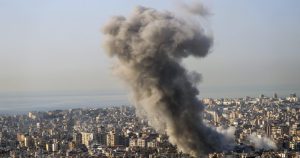UN accuses Israel of tank raid on peacekeepers in Lebanon
Unlock the Editor’s Digest for free
Roula Khalaf, Editor of the FT, selects her favourite stories in this weekly newsletter.
The UN accused Israel of a “flagrant violation” of international law on Sunday after Israeli tanks broke into a position stationed by peacekeepers in southern Lebanon, hours before Benjamin Netanyahu told international forces to withdraw from combat areas.
The Israeli prime minister’s demand came as Israeli forces continued their fierce bombardment of the country and ramped up their offensive in the north of the Gaza Strip.
Israel has faced widespread international criticism after several soldiers from Unifil, the UN-mandated force deployed along the de facto border between Israel and Lebanon, were injured by Israeli fire during the invasion of southern Lebanon last week. Israeli air strikes have also killed two Lebanese soldiers, according to the Lebanese military.
The UN peacekeepers said that IDF tanks, early on Sunday, “destroyed” the main gate of its position in Ramiya, where fighting between Israel and Hizbollah has been fierce. Unifil said Israeli troops “forcibly entered the position” and demanded “that the base turn out its lights”, leaving 45 minutes later.
Around two hours later, Unifil said that “several rounds” fired 100m away from the base let off smoke, which caused 15 peacekeepers to require treatment for “skin irritation and gastrointestinal reactions”. It also said IDF troops had stopped Unifil troops completing a logistical movement in a separate area on Saturday. The IDF did not immediately respond to a request for comment.
Before the reports emerged on Sunday, Italy’s prime minister Giorgia Meloni told Netanyahu that what she called Israeli attacks on Unifil were “unacceptable”. US secretary of defence Lloyd Austin also expressed “deep concern” in a call with his Israeli counterpart Yoav Gallant on Saturday.
However, in a video published on Sunday, Netanyahu hit back at the criticism and said Unifil should pull back from areas where fighting was taking place. “We regret the harm to Unifil soldiers and we are doing our utmost to prevent such harm. But the simplest and most obvious way to ensure this is simply to withdraw them from the danger zone,” he said.
Lebanon’s prime minister Najib Mikati rejected Netanyahu’s demand and said Lebanon was committed to the 2006 UN resolution that mandates Unifil’s presence. He called on the international community to “stop the Israeli aggression against Lebanon”.

Unifil’s mandate is to keep the peace and help the Lebanese government and national army build its presence in border areas where Hizbollah has long held sway. But both Israel and Lebanon complain the mandate has never been properly implemented.
Fighting in southern Lebanon’s hilly terrain continued on Sunday, with Hizbollah reporting clashes with Israeli troops. The Lebanese group launched 115 rockets at Israel by mid-afternoon, according to the Israeli military, while Israeli jets and artillery pounded targets in southern Lebanon.
Lebanese health authorities said 15 people had been killed by Israeli air raids on Saturday, including in areas considered to be outside of the Shia militant group’s traditional strongholds.
Israeli bombing also damaged three hospitals in eastern Lebanon’s Bekaa region, Lebanese health authorities said. Meanwhile, the Lebanese Red Cross said four of its rescue volunteers were injured by a strike as they attended the scene of a bombing in south Lebanon.
On Saturday night, Israeli jets hit the southern Lebanon’s Nabatieh. Lebanese state media compared the attack to a “hurricane”, saying the Israeli military had appeared to target the commercial centre of one of southern Lebanon’s largest towns.
Fires blazed in the wreckage of Nabatieh’s old market district as rescue workers picked their way through the rubble, footage showed, caking surrounding streets in thick grey dust. Lebanese health authorities said eight people were hurt.
The Israeli military had warned people to leave the town about 10 days ago. On Sunday, it warned people to flee a further 18 southern Lebanese communities. The UN estimates such orders now cover an area equivalent to a quarter of Lebanon’s entire territory.
Israeli forces also expanded their offensive in the north of Gaza, after encircling and bombarding the area of Jabalia, which before the war was home to a densely populated refugee camp.
The camp has been the scene of several pitched battles between Israeli forces and Hamas, as the militant group attempts to regroup in the area. In the last few days, the IDF has ordered thousands of civilians to leave the north of Gaza and move south to an overcrowded “humanitarian zone” in Al Mawasi.
Health officials in Gaza said the Israeli offensive had killed 52 people in the past 24 hours. The IDF said it had killed “dozens” of Hamas fighters in the same period.
Additional reporting by Amy Kazmin in Rome and Steff Chávez in Washington
#accuses #Israel #tank #raid #peacekeepers #Lebanon




